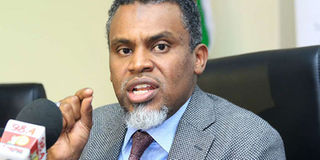President, DPP and DCI must keep the tempo of anti-graft war

Director of Public Prosecutions Noordin Haji orders the arrest of Nairobi Governor Mike Sonko on December 6, 2019, in Nairobi. PHOTO | FILE | NATION MEDIA GROUP
What you need to know:
- We appear blinded by heroism and the worship of individuals to whom we owe allegiance for whatever reason at the expense of the greater good.
- In the public court, government officers who weather allegations of corruption, abuse of office, blatant breach of law and other crimes are a manifestation of impunity.
To lose public interest and confidence in the court is tragic.
This statement is a dichotomy that divides and unites Kenyans in equal measure.
The Judiciary and the police should never be the homes of corruption. Otherwise, the country’s collective cynicism on the fight against the monster will be justified.
Despite this, there is a need to speak to the justice triangle to contextualise the interaction and contradiction between the police, the prosecution and the courts.
Arrest and prosecution are only an aspect of the justice system; it is not the whole picture. For the past few months, we seem to have excelled in high-profile arrests.
This tends to happen at the brink of pressure and diluted public allegiance to political institutions and has not appeased ordinary citizens.
Police and prosecutorial actions only aid the courts to do their work. There is an assumption in the public eye that the court should be the home of justice. This supposition is now contestable.
COMMENDATIONS
But we seem to have perfected the art of blame. Very few take responsibility for their omission or commission.
We appear blinded by heroism and the worship of individuals to whom we owe allegiance for whatever reason at the expense of the greater good.
Be that as it may, we need to give the bouquets and barbs of 2019 to the officials who did their job and those who shirked responsibility.
The Director of Public Prosecutions, Mr Noordin Haji, outperformed his predecessors. Mr Haji worked as though his office had powers beyond those accorded it by the Constitution.
The Director of Criminal Investigations, Mr George Kinoti, worked with a zeal never before seen in that department.
He went about the job as if his office acquired new forensic technology besides the bravery to confront the powerful.
The Ethics and Anti-Corruption Commission CEO, Mr Twalib Mbarak, also deserves a bouquet because most headlines emanated from his work, bringing to book some of the powerful officials – like governors suspected to be pickpocketing the counties they are entrusted to steward.
PUBLIC COURT
In the words of Agesilaus: “Courage is of no value unless accompanied by justice, yet if all men became just, there would be no need for courage.”
This is well articulated by the arrest of high-level government officers. One wonders: what is the sum total of these arrests?
Does ‘Wanjiku’ even care when the National Treasury Cabinet secretary and the governors of Nairobi, Migori, Kiambu and Samburu counties spend nights in police cells?
When such are left to walk scot-free, even on bond and bail terms, the presumption is that their power affords them favour before the courts.
In the public court, government officers who weather allegations of corruption, abuse of office, blatant breach of law and other crimes are a manifestation of impunity.
It evokes memories of the 1980s and ’90s, when the refrain “Do you know who I am?” was the order of the day.
The consistency by the President to denounce those who offend the law is a clear message in seeking to find truth.
President Uhuru Kenyatta is depicted as though he finally understands the reality of keeping friends too close for political reasons when professional expectation demands results. For this, he deserves a bouquet.
IRONCLAD EVIDENCE
The presidency enjoys the double jurisdiction of handling professional and political matters. What doesn’t change is that it should remain just and right.
The courts listen and adjudicate matters through two important proof principles: proof beyond reasonable doubt on criminal matters and balance of probability in civil matters.
The onus is on the prosecution or competing parties to make evidence-backed submissions alongside testimonies by believable witnesses and corroborate observations before the court.
Similarly, it is the responsibility of the police to investigate and present credible cases to the prosecution. And then the courts will make the call as to who is guilty and who is not.
The President should be thanked for making us believe again, on December 12, that all is not lost.
LEADING FROM THE FRONT
He has, for a while, demonstrated that his office can be the embodiment of effective leadership.
High drama on arrest with no eventual conviction is, therefore, a sure way to erode confidence in such an important office in our society as the courts and to disappoint Kenyans.
The President must keep his foot on the ground so that we may again believe in the institutions of justice.
And to the rest of us, let us not be the ones to take the barbs for protecting those perceived to be corrupt either because of political allegiance or financial reward.
Mr Mukoya is the Executive Director, Legal Resources Foundation, [email protected]




